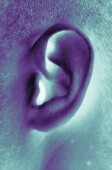
THURSDAY, April 11 (HealthDay News) — Playing a certain type of sound stimulation during sleep might help improve your memory, a small new study suggests.
Slow oscillations in brain activity occur during slow-wave sleep and are critical for retaining memories. This study found that playing sounds synchronized to the rhythm of those oscillations enhances the oscillations and boosts memory.
The findings suggest an easy and noninvasive way to enhance memory, according to the authors of the study, which was published online April 11 in the journal Neuron.
“The beauty lies in the simplicity to apply auditory stimulation at low intensities — an approach that is both practical and ethical, if compared, for example, with electrical stimulation — and therefore portrays a straightforward tool for clinical settings to enhance sleep rhythms,” Dr. Jan Born, of the University of Tubingen, in Germany, said in a journal news release.
Born and his colleagues conducted their tests on 11 people while they slept on different nights. When exposed to stimulating sounds that were in sync with the brain’s slow oscillation rhythm, the participants were better able to remember word associations they had learned the evening before.
Sound stimulation out of sync with the brain’s slow oscillation rhythm was ineffective in improving memory.
The researchers said the sound stimulation technique might also help improve sleep.
More information
The U.S. National Institutes of Health explains how sleep strengthens memories.

